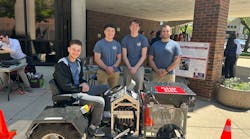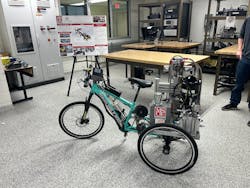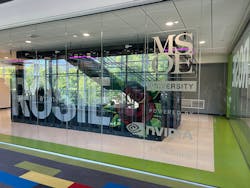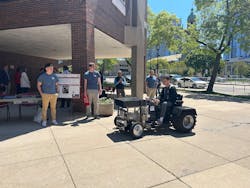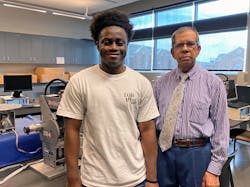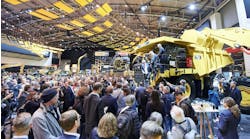Recently a colleague and I had the opportunity to visit the Milwaukee School of Engineering (MSOE) campus. While I've been a few times before, and am lucky enough to essentially have it in my backyard, I had not yet had the chance to get as in-depth of a tour as we did the other week.
We got to speak with students and faculty about the various engineering programs offered at the school as well as the opportunities offered to the students to put their classroom knowledge to work.
Hands-On Education is Vital for Career Prep
Our first visit of the tour was to the school's Motion Controls lab where we got to meet the team which participated in the National Fluid Power Association (NFPA) Fluid Power Vehicle Challenge. The team consisted of three underclassmen who prior to joining MSOE's vehicle challenge team were not as familiar with fluid power but expressed an increased interest after participating in this event.
The Fluid Power Vehicle Challenge tasks students with building a vehicle, based on a bicycle, which employs hydraulics and pneumatics as well as electronics. All three said they gained valuable experience working on the vehicle design and encourage others to participate in hands-on experiences like the Vehicle Challenge if possible.
READ MORE about the NFPA Fluid Power Vehicle Challenge.
Team member Jeff Kass, a freshman studying management at MSOE, was particularly emphatic about what a great opportunity it was to participate in the vehicle challenge and hopes more schools get involved with the NFPA program. He told us he recently completed his fluid power specialist certification through the International Fluid Power Society (IFPS) which he said was possible after learning so much about hydraulics and pneumatics while working on the team's vehicle design.
All three team members, which in addition to Kass included Daniel Cantu, sophomore, mechanical engineering, and Brandon Janes, junior, mechanical engineering, said they appreciated the hands-on experience provided by the vehicle challenge which will help them in their future studies and eventual careers.
Though a small team compared to others taking part in the vehicle challenge, the MSOE team took home three awards:
- third place in the Sprint Race,
- second place in the Regen Race, and
- Judge’s Choice Award for Meritorious Achievement by Underclassmen.
The amount of hands-on educational opportunities provided at MSOE alongside classroom instruction is one of the things which makes the school so unique Dr. Sheila Ross, chair of the Electrical Engineering and Computer Science Department, told us while taking us on a tour of her department. She showed us how many of the classrooms include lab tables as most classes include a mix of lecture and lab work so students can put what they've learned into action which helps provide a more well rounded experience. It also better prepares them for working in the field once they have graduated.
Our trip to MSOE coincided with the end of the school year and Senior Project Showcase during which students who are about to graduate put their capstone projects on display around campus. We got to see a variety of interesting projects from biomedical engineering students, those from the computer science department — which get to make use of ROSIE, a supercomputer donated by alum and NVIDIA executive Dwight Diercks and his wife Dian — as well as a project from electrical engineering students in which they partnered with the Fluid Power Institute, located at MSOE, to electrify a 1/4-scale agricultural tractor.
For this tractor project, the students replaced the combustion engine with a battery and electric motors. While some hydraulics were removed from the tractor, many were left on it, challenging the students to learn how to pair electronic and fluid power components — an increasingly common issue in the engineering field today as electrification progresses. Most of the students who worked on the tractor did not have much knowledge of hydraulics and pneumatics prior to working on the tractor, but have now gained expanded knowledge they can bring to their future careers.
Adding New Curriculums to Meet Engineering Skill Needs
As technology has evolved, so too have the skills required of engineers. The greater integration of mechanical and electrical technologies is bringing about the need for engineers to have knowledge of both. Seeing this need in the industry, schools have begun adding mechatronics — a term for the combining of mechanical and electrical technologies — courses to their curriculum.
Recently, the College of Science, Technology, Engineering, Mathematics and Transportation (STEM-T) at South Carolina State University launched a mechatronics engineering degree program. The school added it because of the need it saw in the marketplace and a desire to equip its students with the skills necessary for a future in the engineering workforce. "There is no industry where mechanical is needed but not electrical or where electrical is needed but not mechanical," said Dr. Hasanul A. Basher, professor and chairman of SC State’s Department of Engineering Technology, in the university's press release announcing the launch of the degree program.
In addition, the U.S. Department of Labor has noted mechatronics as an emerging growth area for new jobs the school states in its press release.
The school notes the field of mechatronics also includes advanced control systems to design, build and operate smart systems and processes. Basher added that modern mechatronics may integrate elements of aviation, artificial intelligence, telecommunications, and cybersecurity.
READ MORE: The Role of Fluid Power in Mechatronics
Mechatronics is applicable in a variety of industries including robotics, manufacturing, autonomous vehicles and more. As such, students who study mechatronics will be be a desirable asset to a range of engineering teams.
According to Basher, mechatronics education has grown over the past decade globally but has lagged in the U.S. Currently there are few universities offering a Bachelor of Science degree in this field. However, the need for education in this engineering field is only expected to grow in the coming years as Basher predicts mechatronics will dominate the manufacturing landscape because it includes essential components that will enable all industries to manufacture faster and better.
"This is the future for many, many companies, and South Carolina State will be among the first to offer them the kind of engineers they need," he concluded.
We want to hear from you!
What skills will be needed from engineers in the future? What schools or educational initiatives are you seeing that will benefit the fluid power and greater engineering community? How should schools be going about preparing engineers of the future?Let us know! Email me at [email protected] or reach out to us on social media.
Twitter: @TechnlgyEditor or @PowerMotionTech
LinkedIn: @PowerMotionTechEditor’s Note: Power & Motion's WISE (Workers in Science and Engineering) hub compiles our coverage of workplace issues affecting the engineering field, in addition to contributions from equity seeking groups and subject matter experts within various subdisciplines.
